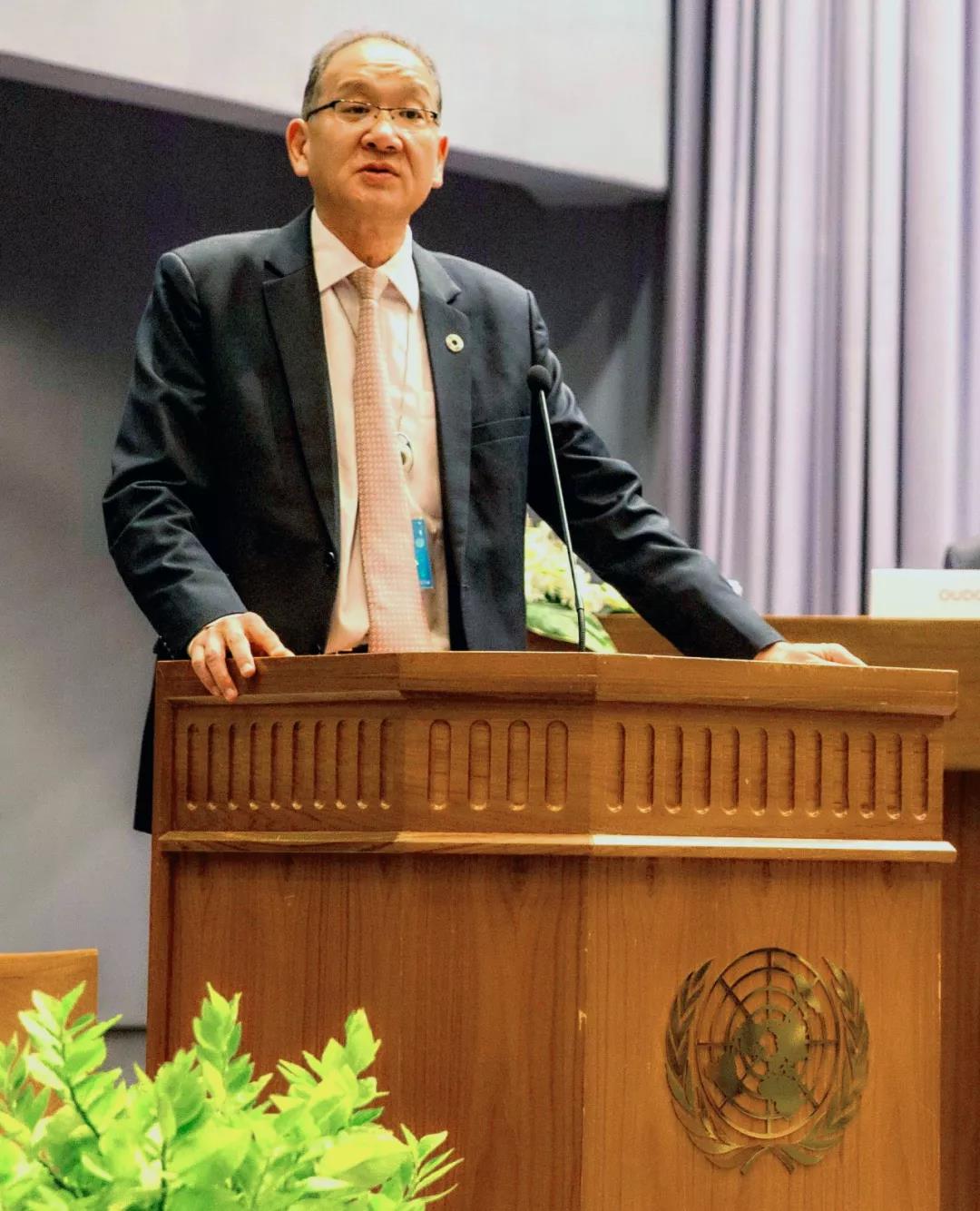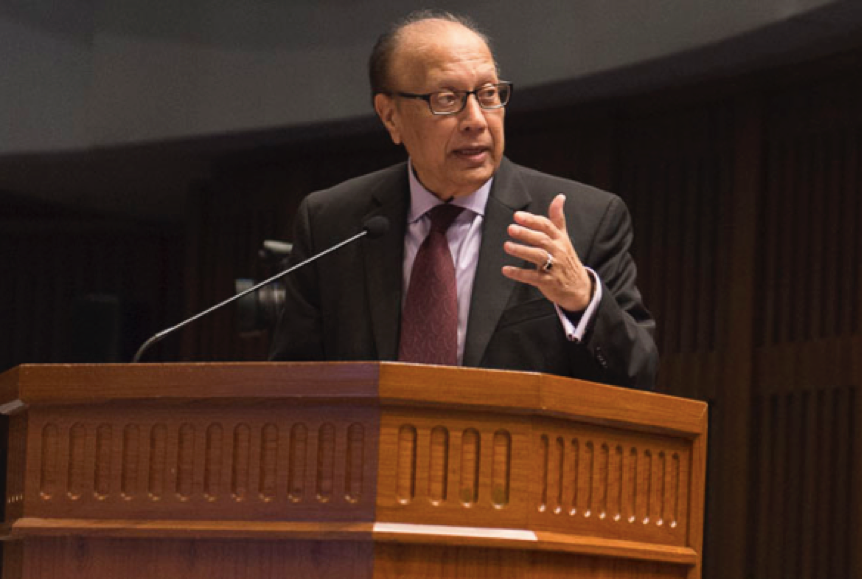


Committed to Sustainable Cities and Human Settlements for All

In Special Consultative Status with ECOSOC
(Bangkok, October
31) The 2018 Annual Session of Global Forum on Human Settlements (GFHS 2018)
successfully convened as an important observance of the World Cities Day
2018 at the United Nations Conference Center, Bangkok,
Thailand on 30-31October. Mr. Hongjoo Hahm, Officer-in-Charge of the
United Nations Economic and Social Commission for Asia and the Pacific attended
and addressed the forum.

Group
photo of all participants at the opening session

Themed as
“Advancing Urban Innovations to Achieve SDG 11 and the New Urban Agenda (NUA)”,
the 2-day event brought together over 400 major stakeholders from more than 40
countries for sharing experiences and building partnerships. 13 delegates
representing cities, businesses, academia and civil society announced
commitments to support sustainable and resilient cities at the forum. The
Sustainable Cities and Human Settlements Awards (SCAHSA) were presented to a
total of 36 winners, including the city of Hua Hin, Thailand, the city of
Indore, India, Kalundborg Symbiosis, Denmark, Qingdao Sino-German Ecopark,
China, Arcadis Shelter Program, among others. The awarded practices have made
significant contributions to sustainable cities and human settlements for all.

Observance
of “World Cities Day 2018” – representatives from various sectors making the
commitment to
sustainable urban development at UN Conference Center

Mr.
Hongjoo Hahm, Officer-in-Charge of UN ESCAP delivering welcome remarks
At the opening,
Mr. Hongjoo Hahm, Officer-in-Charge of the United Nations Economic and Social
Commission for Asia and the Pacific emphasized that “innovation as a strategic
investment offering benefits to all stakeholders. Our vision of future cities
can be powerful. We recognize that cities, supported by strong partners, can
foster innovation and build great communities. If we are successful in working
toward the objectives of the 2030 Agenda and the New Urban Agenda, we will
reshape the cities of the Asia-Pacific region, so they look and function very
differently than they do today.”

Ambassador Anwarul K. Chowdhury, Chairman of GFHS, Former UN Under-Secretary-General and High Representative
making
an opening address
Ambassador Anwarul
K. Chowdhury, Chairman of GFHS, Former UN Under-Secretary-General and High
Representative highlighted that the magnitude of urban challenges can be
overcome to foster parallel opportunities. “We are encouraged as the world
leaders adopted by consensus in September 2015 the United Nations 2030 Agenda
for Sustainable Development, which included among its 17 Sustainable
Development Goals (SDGs), a specific goal – Goal 11 - to make cities and human
settlements inclusive, safe, resilient and sustainable. Urbanization offers
unprecedented opportunities for increasing living standards, life expectancy
and literacy levels, environmental sustainability and more efficient use of
increasingly scarce natural resources. For women, urbanization is associated
with greater access to employment opportunities, lower fertility levels and
increased independence. GFHS strongly advocates for enhanced lasting
partnership which not only echoes with SDG 17, but also calls for breaking the
political, economic, social, gender and even geographic hierarchy and build up
comprehensive, cooperative, pragmatic and equal partnership. This will
facilitate implementation of SDGs and NUA.”
Other
distinguished guests include Mr. Ralph Regenvanu, Minister of Foreign Affairs,
International Cooperation and External Trade of Vanuatu; Mr. Stefanos Fotiou,
Director, Environment and Development Division, UN ESCAP; Mr. Oudom Wang, Permanent
Representative of Vanuatu to UNESCAP, Chairman of Global One Belt One Road
Association;Dr. Taj Hamad,
Vice Chairman of Global Forum on Human Settlements, Secretary General of Universal
Peace Federation;Pol. Lt. Col.
Kitibodee Pravitra, Governor of Krabi Province of Thailand, Prince of Thai
Royal Family; Mr. Mushtaq Memon, Asia and the Pacific Coordinator for Resources
Efficiency Programme, UN Environment; Mr. Choudhury Rudra Charan Mohanty,
Coordinator of Environment Programme, UNCRD/UN DESA, Mr. Lu Haifeng, Secretary
General of Global Forum on Human Settlements; Dr. Benno Boer, Chief of Natural
Sciences, UNESCO Bangkok Office; Mr. Serge Salat, President, Urban Morphology
and Complex Systems Institute, Paris, France, Leading Expert of International
Green Model City Standards 3.0, Mr. Benson Tam, Chairman of VENTUROUS as well
as mayors from different regions, renowned experts and business leaders.
The Forum was
organized by the Global Forum on Human Settlements (GFHS) with support from the
United Nations Economic and Social Commission for Asia and the Pacific (UNESCAP),
in cooperation with the Global One Belt One Road Association (GOBA), World
Association of Non-Governmental Organizations (WANGO), Universal Peace
Federation (UPF) and other organizations.
GFHS 2018 was
designed to enhance capacity building, foster new partnerships and effective
actions, and promote cooperation and green development. Critical issues of
localizing the SDGs and the NUA were deeply addressed, including resilient and circular
economy, building international green model city – urban innovation and green
growth, financing for sustainable urban infrastructure, blockchain technology
and smart cities, urban water cycle management and SDGs, and eco-city and fabricated
buildings.
While the SDGs are
global, their achievements will depend on the ability and efforts of local and
regional governments and the partnership with stakeholders to make them a
reality in cities and communities. As stressed in the Synthesis Report of the
UN Secretary General, “many of the investments to achieve
the sustainable development goals will take place at the subnational level and
be led by local authorities.” SDG 11 calling for sustainable cities and
human settlements is the lynchpin of the localizing process of all 17 goals.
GFHS 2018 has emphasized not only the great potential of cities to foster
innovation and realize green growth, but also the profound significance of
well-designed policies, strategies and approaches to maximize the benefits of
local actions from city governments, industries and civil societies.
As a highlight of
the forum, the Sustainable Cities and Human Settlements Awards Ceremony
(SCAHSA) 2018 was unveiled at the United Nations Conference Center in Bangkok.
This year’s Global Green City was awarded to city of Hua Hin, Thailand, the
Global Green District was given to Qingdao Sino-German Ecopark, China, and
Langfang Dachang Movie Town, China was selected as a Global Model on
Characteristic Town. Daintree National Park, Queensland, Australia bagged the
honor of Global Low-Carbon Ecological Scenic Spot. Global Human Settlements
Award on Planning and Design was presented to Mr. Alex Kerr’s rural revival
project in Japan through restoring abandoned houses, and Global Human Settlements
Model of Green Technology was granted to Climate Drops designed by KT-Energy
LLC in Ukraine. The complete list of award winners can be accessed by clicking
the link (http://www.gfhsforum.org/Hiring?_l=en).

Awarders
and awardees, Sustainable Cities and Human Settlements Awards Ceremony 2018
Meanwhile, the
“International Green Model City (IGMC) Initiative” has drawn a lot of attention
through a few interesting activities. To improve public awareness and
engagement, the premiere show for IGMC 3-D animation film that was inspired by
IGMC Standards 3.0 and produced based on the life of the SaSa family of three
provided a quick visual representation of what a smarter, greener, more
inclusive city looks like. At the forum, a
special training session was conducted to further promote the understanding of
IGMC Standards 3.0 and to propel substantive actions of integrating the
Standards into urban planning and development. IGMC Standards 3.0 is an assessment
and planning tool for sustainable urban development and provides technical
means and evaluation methods for the implementation of the 2030 Sustainable
Development Agenda and the New Urban Agenda at local and community levels.

On top of that, to
coincide with the sub-theme of the “World Environment Day” this year, an
exhibition that calls actions on plastic pollution was displayed. It shows on
one hand that GFHS has been focused on combating environmental pollution and
safeguarding ecosystem services, and on the other hand it helps raise the
public awareness and urge all relevant stakeholders to play a part.
With cities, business and all sectors facing old and emerging sustainable development challenges, GFHS 2018 provided most of the solutions for reference. The Forum came to a productive close by setting the way forward and calling to enhance the localization of SDGs and the New Urban Agenda and achieve the transition to green growth through the application of a circular economy approach, scaling up financing for sustainable urban infrastructure, applying blockchain and other innovative technologies for smart cities, improving urban water management, building better, lasting and enhanced partnership and creating international green model city.
About Global Forum on Human Settlements (GFHS)
Global Forum on Human Settlements (GFHS) is a 501(c) (3) not-for-profit international organization, with Special Consultative Status with ECOSOC. GFHS is committed to sustainable cities and human settlements for all, and acts as a world platform for dialogue on sustainable cities and human settlements. GFHS has successfully conducted various cooperation with the United Nations Department of Economic and Social Affairs, the United Nations Environment Programme, and the United Nations Human Settlements Programme. The annual conference of Global Forum on Human Settlements has been successfully held in China, the United States, Brazil, Germany, Colombia, Ecuador and Thailand for 13 consecutive years. Around 14,000 representatives from all sectors of society have attended the Forums which provides a high-level platform for dialogue among governments, non-governmental organizations, corporates, and academic institutes. GFHS has made significant contribution to the promotion and implementation of United Nations Millennium Development Goals, the Habitat Agenda, the 2030 Agenda for Sustainable Development and the New Urban Agenda.
Copyright © Global Forum on Human Settlements (GFHS)
